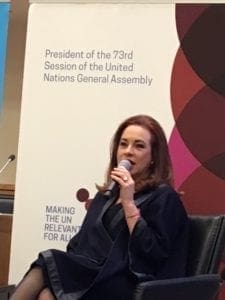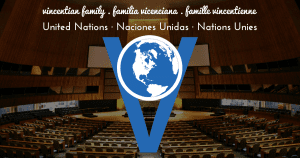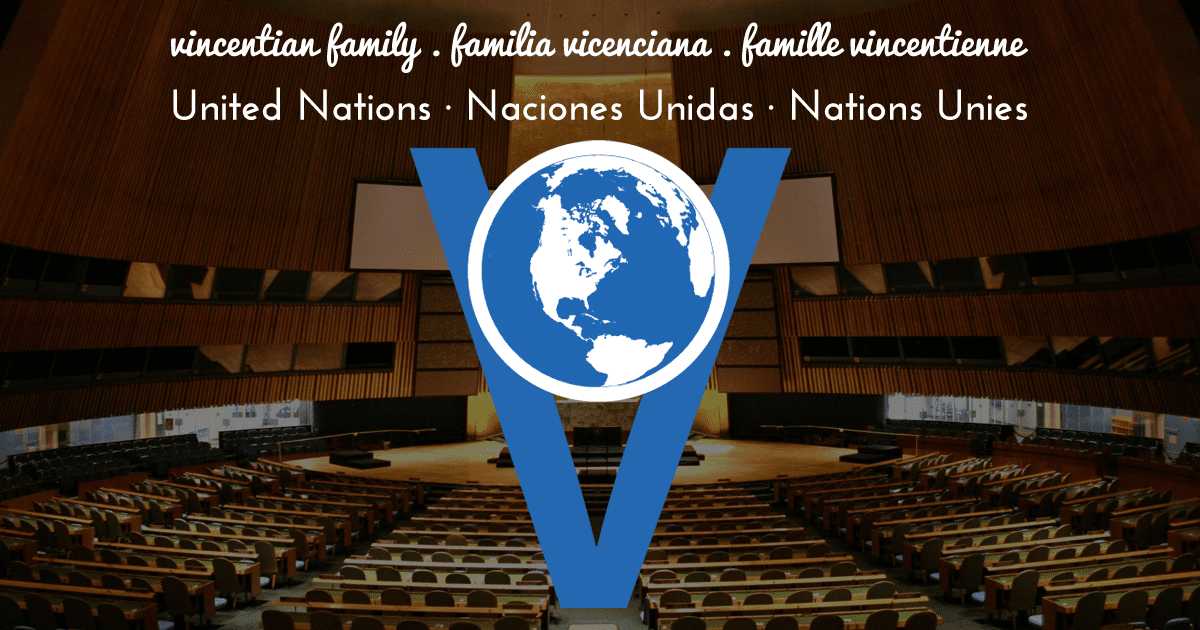Making The UN Relevant Is Theme Of New UN General Assembly President
“Making the UN relevant for all” is the overarching theme for new UN General Assembly (GA) President, Maria Fernanda Espinosa Garces, of Ecuador. Ms. Garces, the fourth woman to be named UN General Assembly President, met with NGOs in early December in New York to discuss her priorities.
“To make the UN more relevant,” she said, “we need to be more efficient, transparent, to listen more to the people we represent. We need our feet on the ground.”
“We need to deliver better,” Ms. Garces said. Therefore, seven priorities have been established.
BACKGROUND ON MS. GARCES
 Ms. Garces is the 73rd President of the General Assembly. She is the former Minister for Foreign Affairs in Ecuador. According to the UN, Ms. Espinosa has more than 20 years of multilateral experience in international negotiations, peace, security, defense, disarmament, human rights, indigenous issues, gender equality, sustainable development, environment, biodiversity, climate change and multilateral cooperation. She twice served Ecuador as Minister for Foreign Affairs, as Minister for National Defense and as Coordinating Minister for Natural and Cultural Heritage.
Ms. Garces is the 73rd President of the General Assembly. She is the former Minister for Foreign Affairs in Ecuador. According to the UN, Ms. Espinosa has more than 20 years of multilateral experience in international negotiations, peace, security, defense, disarmament, human rights, indigenous issues, gender equality, sustainable development, environment, biodiversity, climate change and multilateral cooperation. She twice served Ecuador as Minister for Foreign Affairs, as Minister for National Defense and as Coordinating Minister for Natural and Cultural Heritage.
GENERAL ASSEMBLY ROLE
The General Assembly is a forum for discussions, debates, and recommendations on key subjects at the United Nations. All member states have a vote in the General Assembly. Its primary work takes place from September to December, and into January, although the General Assembly convenes at other times of the year to address pressing issues.
NGOS NEEDED NOW MORE THAN EVER
Mrs. Garces pointed out that the work of nongovernmental organizations is needed now more than ever. It is not a secret, she said, that all need to join forces to ensure that multilateralism is taken seriously and that we build for both a better present and future. She noted the responsibility we have for future generations.
SEVEN PRIORITIES
Ms. Garces engaged in broad consultations with various groups in identifying seven priorities crucial to making the UN relevant for all. These focal areas, she said, are connected not only to the mandates of the General Assembly, but also to the needs and expectations of people around the world.
THE SEVEN PRIORITIES ARE:
- Revitalization of the UN. Garces said this is not a priority featured on the front page of newspapers, but is about making sure the UN is “fit for purpose.” Whatever the bureaucracy in the UN, member states, officials, delegates do every day of their lives, she said, they should all think of people in need. “When things get tough here and things get tough pretty often,” she said, “I always think, ‘if we take this decision, who are the human beings behind this, who is going to suffer, who is going to have more hope, who is going to be more affected by the decision we take?’ It is an important exercise.”
UN revitalization, from a General Assembly perspective, has three foci:
- Support for the UN Secretary General, Antonio Guterres, in the reform process.She noted the UN is undergoing a profound reorganization.
- To boost the process of revitalization of the General Assembly.The General Assembly is the “parliament of humanity,” Ms. Garces said. She noted challenges the GA faces in being able to deliver; that there is an implementation gap. The General Assembly passes 600 resolutions a year, she said, but the follow up and mainstreaming (of policies, practices, and resolutions) comes into question. “There are a lot of issues we need to address,” she said.
- Reform of the Security Council. This is one of the most contentious but most divisive issues, she mentioned.
- Gender Equality. Ms. Garces noted the need for the political empowerment of women and greater involvement of women in decision-making. She further said that the Commission on the Status of Women will take place March 11-22 in New York. There will be a high level event at that time, involving women heads of state.
- Persons with Disabilities. Among UN efforts to address the needs of persons with disabilities, the new President said, was the recent launching of a steering committee to investigate accessibility of UN buildings and offices around the world.
- Climate change and climate action. Garces stated a climate summit is scheduled this year (September 9-11 in Berlin) and that there would be an earlier meeting in preparation for it. She further mentioned a recently launched global campaign against single use plastics and plastic pollution, and the importance of addressing ocean pollution. She said such efforts will continue in 2019. Time is running out in terms of addressing climate action, the GA President emphasized. She delivered bold message in Poland a few days before addressing NGOS, pointing out the need to act urgently on climate issues. “It’s going to be tragic if we do not increase our ambition and change how we produce and consume, or we will all disappear,” she said. “We have to act quickly and now.”
- Youth, peace and security. The approach the UN is using is that of preventive diplomacy and sustaining peace. It is important, Ms. Garces said, to put young people at the center of the architecture of peaceful societies. There will be a series of activities coming up related to this issue, including a conference in Helsinki in March, with echoes of that Conference in New York.
- Decent work. Garces pointed out that 2019 will include the centenary of the International Labor Organization and that an important report will be released about the future of work. The UN’s Economic and Social Council ECOSOC will assess Sustainable Development Goal 8 on decent work and economic growth. She hopes that women, their access to quality jobs, and reducing the salary gap between that earned by men and women will be at the center of conversations about decent work
- Migrants and refugees. As she spoke, the GA President was about to travel to Marrakech, Morocco, where the General Assembly in December approved the first Global Compact on Migration. She noted the importance of having a strong compact and a shared framework for the exchange of good practices in addressing issues related to migrants. Civil society organizations have a very strong role to play in defense of the rights of migrants and people on the move in, she said.
OTHER ISSUES
In addition to her priorities, Ms. Garces was asked about engaging persons in poverty in the work of the UN. One of the beauties of the Sustainable Development Goals, she said, is that it is a tool that allows local communities to participate.
In example, she mentioned youth work in India, where she observed youth from shanty towns transforming their communities’ livelihoods by implementing the Sustainable Development Goals at the local level.
The new GA President further discussed homelessness, youth engagement in UN work, women’s issues, indigenous issues, issues in Latin America, corruption, the Security Council, and more.

Tags: United Nations







0 Comments